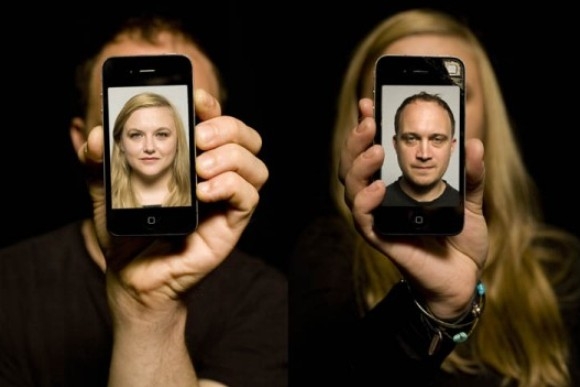Catherine Love: Theatre in the digital age

© Martin Figura
We are frequently told, in this age of tweets, snapchats and constant updates, that technology has changed the way we function in the world. The internet and smartphones have not just made us better connected – they have changed the way we think. We check our emails last thing before going to bed; we carry endless information in our pockets; we compose the story of our lives in 140 character chunks.
This constant sense of connection is the subject of Hannah Jane Walker and Chris Thorpe‘s latest show, I Wish I Was Lonely, currently running at Battersea Arts Centre. Entering the show, audience members are instructed – in a neat inversion of the usual state of affairs – to leave their phones on. We can even answer calls if we like. Occasionally involving the chirruping electronic devices in our palms, the show explores our attachment to these objects, the ways in which they have altered our lives – for better and for worse – and the consequences they have for human relationships.
Watching the show for the second time last week (I first saw it in Edinburgh last year), I was once again struck by the thought that theatre explores technology best when relying on simplicity. Plenty of work has attempted to engage with new technological advances, from flashy multimedia shows to tweeted dramas, but in attempting to play by these new rules theatre often forgets the old rules of its own form. When it comes to technical wizardry, other mediums are always going to perform better. If theatre is able to explore the effects of the internet on our lives in any way, it is through its impact on our behaviour.
I had a similar brainwave recently while watching Chris Goode‘s Hippo World Guest Book, a simple but extraordinary piece in which Goode reads aloud from an online comment board. With the aid of just a performer and a microphone, we get a powerful metaphor for the trajectory of the internet, from enthusiasm to trolling to computer-generated spam. Other shows have successfully explored our relationship with the internet by approaching it obliquely. Without ever being explicitly "about" the internet, Anthony Neilson‘s Narrative took the shape of our online experiences, creating the impression of hopping between tabs and throwing in a cat video for good measure. In Love and Information, meanwhile, Caryl Churchill‘s miniature bytes of theatrical data imitated the digital age’s onslaught of useless knowledge.
As our ever-present technology increasingly runs our lives, it seems unlikely that theatre will stop grappling with this subject matter any time soon. Just this year, there are at least three more productions coming up that attempt to engage with some of the issues thrown up by the digital age. James Graham‘s new play Privacy is looking at the collection of our personal information, a topic that is also picked up by Theatre Ad Infinitum’s latest show Light through the surprising medium of mime. At the Royal Court, meanwhile, The Nether by Jennifer Haley will be exploring the darker side of virtual reality.
It remains to be seen how these productions will handle this tricky aspect of modern life, but with any luck they will remember the form they are working with. Discussing the live impact of one of his shows during an interview, playwright Simon Stephens once remarked to me that theatre feels much more radical in a time when we are used to engaging with the world through screens. Perhaps it is through this radical act of a group of people gathering in a room together that we can really get to grips with how digital technology is rewiring our minds.










